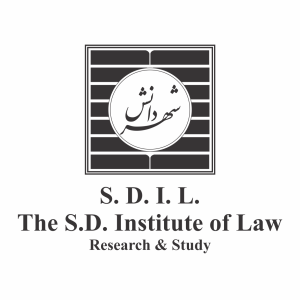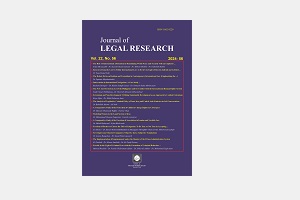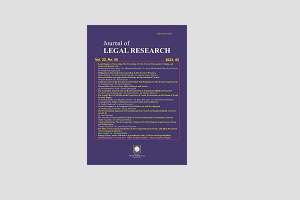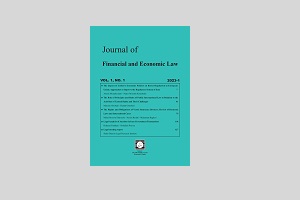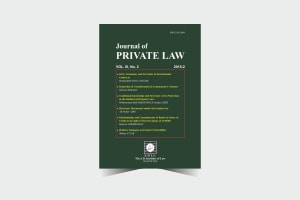Journal of
Legal Research
Number 10
Vol. V No. 2
Autumn 2006 – Winter 2007
Managing Editor: Vahid Eshtiagh
Editor-in-Chief: Seyyed Ghasem Zamani
CONTENTS
Articles
UN Security Council Practice in Iran’s Nuclear Case: From Report to Sanction
Seyed Ghasem Zamani (Ph.D.), Seyed Hossein Sadat Maydani
Defining genocide in the light of ICTY and ICTR decisions
Hadi Azari
Endowment of Company’s Shares: Its Legal Possibility and Social Necessity
Vahid Eshtiagh (Ph.D.)
Freedom of Expression and Violation of Respect for Religions and Prophets in the Europe from Human Rights Perspective
Tayebeh Asadi
Smuggling of Goods and Currency in the Iranian Penal Law
Mansoor Rahmdel (Ph.D.)
Jurisdiction and Sentences in Iraqi High Criminal Court: From the Establishment of the Tribunal to the Execution of Saddam
Maedeh Mirshams Shahshahani
Special Issue: Tax Law in Iran and Other Countries
Value Added Tax (VAT) and Tax Fairness
Seyed Aziz Masoomi
Avoidance of Double Taxation in Iranian Law
Mohsen Babakhani
Tax Procedure in Iran (Structure, Strategic Principles, Problems and Difficulties)
Ali Tazikinezhad, Jaffar Shafiee Sardasht
Survey on Tax Regulations in Energy Charter Treaty (ECT) and Legal Effects of Iran’s Accession
Behnam Ghaffari Farsani & Mohsen Sadeghi
Offences in the matter of taxation in French law
Jean Pradel and Michel Danti-Juan
Translation and research by: Ali Khaleghi (Ph.D.)
Critique and Presentation
Supreme Court Judgment on Wife Requisition for a Divorce Because of Husband Remarriage
Ramazam Dehghan
The UN Security Council Resolution 1701 (2006) and International Law
Nader Saed (Ph.D.)
Articles
UN Security Council Practice in Iran’s Nuclear Case:
From Report to Sanction
Seyed Ghasem Zamani (Ph.D.)
Seyed Hossein Sadat Maydani
Abstract:
On 23 December 2006 UN Security Council, acting under article 41 of chapter VII of the Charter, unanimously adopted resolution 1737 on Iran’s Nuclear Program. The Council, inter alia noting with Iran non compliance with the statement of its president of 29 March 2006, and its resolution 1969 of 31 July 2006, decided to impose some sanctions on Iran’s nuclear program. The Council established a new committee, comprised of all council members, to monitor implementation of the imposed sanctions. The Council requested a report within 60 days from the Director General of IAEA on whether Iran had established full and sustained suspension of all activities mentioned in the resolution, as well as on the process of Iranian compliance with all steps required by the IAEA Board, to the Board of Governors and the Council for its consideration. The Council affirmed than it would review Iran’s actions in light of that report and suspend implementation of measures, if and for so long as Iran suspended all enrichment-related and processing activities.
SC resolutions and the statement of its president on Iran’s nuclear program would review in this article from the international law perspective.
Keywords: Security Council, Iran’s Nuclear Program, Non Proliferation, Sanctions, IAEA, SC Resolutions, Uranium Enrichment, International Law.
Defining genocide in the light of ICTY
and ICTR decisions
Hadi Azari
Abstract:
The international Convention on the prevention and suppression of the crime of genocide (1948) has enumerated some activities realized in order to destroy, partly or wholly, national, tribal, racial or ethnical groups. The aim has been to protect the existence of these groups. Although the crime of genocide has not been eradicated, it was in the 1990s that the international criminal tribunals found the opportunity to clarify the elements of this crime. The present article shows the definition of the genocide in the light of the decisions of ITCY and ITCR.
Keywords: Genocide, international crime, international tribunals, ITCY, ITCR
Endowment of Company’s Shares:
Its Legal Possibility and Social Necessity
Vahid Eshtiagh (Ph.D.)
Abstract:
An endowment consists the surrender of a property and devotion of its profits to some purpose. Accordingly it is permissible to endow only such property as can be exploited without detriment to it’s existence, whether it be movable, held in undivided shares or divided up.
On the other hand “Share” is the interest of a share holder in the company measured by a sum of money for the purpose of liability in the first place and of interest in the second.
An important question arises whether it is legally permissible to endow company’s shares. Legal possibility and social necessity of endowment of company’s shares are examined in this article in the light of Iranian civil and commercial codes and Islamic doctrines.
Keywords: Endowment, Shares, Nature of shares, Companies, Civil Code, Commercial Code, Iranian Law.
Freedom of Expression and Violation of Respect for Religions and Prophets in the Europe from Human Rights Perspective
Tayebeh Asadi
Abstract:
Freedom of Expression as a fundamental Right is underlying society development and human promotion. Moreover this freedom is a social right. Then on this character protection of others, prevention of blasphemy, public order, are some barriers on its implementation. It should be noted that the freedom of expression is a civil and political right then it is related to other conceptions and goals for example peace, security, tolerance and prevention of racial discrimination.
Examination of freedom of expression with regard to Jillandsposten Newspaper act in printing some cartoons and showing the cartoon’s film on Danish TV that have been degraded Islamic symbols is one of the basic issues in this article. The examination of this case study with regard to European Court of Human Rights approach could be so effective in explanation of some detailed barriers and conditions of the implementation of the freedom of expression. It should not be forgotten that the best way for a right guarantee is judicial guarantee that has established long side with it.
Keywords: Human Rights, Freedom of Expression, Respect for Religions, Public Order, European Court of Human Rights, Islamic Symbols.
Smuggling of Goods and Currency
in the Iranian Penal Law
Mansoor Rahmdel (Ph.D.)
Abstract:
Smuggling in its all forms, either goods, currency, narcotic drugs, antiques or humankind, is more an economical phenomenon, so, it could be regarded as an economic phenomenon. The reason is that, it aims the benefit. This economic point has different aspects and effects, which inter alias we can note legal and social aspects. One of the social effects, which contain economic points, is unemployment. In addition to social and economic effects, it contains some legal points, which will be explained in details.
Keywords: Smuggling, Iranian Penal Law, Criminal Liability, Currency, Criminal Sanctions.
Jurisdiction and Sentences in Iraqi High Criminal Court: From the Establishment of the Tribunal to the Execution of Saddam
Maedeh Mirshams Shahshahani
Abstract:
The establishment of an special tribunal by enacting its statute, in order to try Saddam Hussein and his co-defendants, was the dream of all the victims of former Ba’ath Regime crimes that in December 10, 2003 came true.
Studying the jurisdiction and sentences of this tribunal, named Iraqi High Criminal Court, which is the subject-matter of this article, shows that as a result of some limitations in the statute, the tribunal is not authorized to try all the attributed crimes. Furthermore, the statute does not prescribe the payment of the payoffs resulting from the war against Iran.
Announcing the death sentence by the Iraqi High Criminal Court and its quick execution, settled all the discussions about the possibility of holding the death penalty by this court but it caused a number of ambiguities about the different aspects of the crimes attributed to Saddam as the most important defendant of the Court.
Keywords: Jurisdiction, Sentence, Iraqi High Criminal Court, Saddam, Ba’ath Regime.
Value Added Tax (VAT) and Tax Fairness
Seyed Aziz Masoomi
Abstract:
Taxation has a life as long as the human civilization. Tax has been used as a tool for society development and it is now seen as a fee for residence in developed countries. Human civilization development has resulted in taxation division to various parts among which VAT is attached more importance for its fairness. To reveal the importance of VAT, it should be said that it is now used a tool for fairness in more than 12 countries, 4.000.000.000 persons (70% of the world population) now live in the countries which have VAT. VAT revenue for the government is annually $18 trillions. This paper dealt with VAT nature and then explains it as a toll for tax fairness.
Keywords: Tax, Value Added Tax, Tax Fairness, Revenue, Iranian Taxation Law, Direct Tax, Indirect Tax.
Avoidance of Double Taxation in Iranian Law
Mohsen Babakhani
Abstract:
Double taxation as an obstacle against foreign investment is seen in Iranian taxation law.
There are some solutions to avoid this taxation in due course against the principal of justice taxation in Iranian law. Iran has signed some treaties with other countries regarding Avoidance of Double Taxation.
In this article the author reviewed certain aspects of avoiding Double taxation in Iranian code and international treaties.
Keywords: Double Taxation, Foreign Investment, Iranian Taxation Law, Avoidance of Double Taxation, Justice Taxation.
Tax Procedure in Iran
(Structure, Strategic Principles, Problems and Difficulties)
Ali Tazikinezhad
Jaffar Shafiee Sardasht
Abstract:
In the taxation process occurrence of dispute between tax-payer and tax authority is something probable and quite natural. There are some references for tax dispute settlements, other than public courts. In tax dispute usually it is tried to settle the disputes through administrative formalities, otherwise they are referred to the first reference available, and that is “Tax Dispute Settlement Board”. After this stage, there are some other references such as “High Council of Taxation” and “Administrative Justice Court” that deal with it on technicalities. Although the main purpose of this study is to shed light on different stages of tax trial and statutes in chronological order, it has been tried, also, to have an eye on the principles of efficient trial and their problems, in the margin. Also the status of Iranian regulations in this regard has been elaborated on.
Keywords: Administration of Tax Affairs, Tax Dispute Settlement Board, High Council of Taxation, Administrative Justice Court, Principles of Tax Procedure.
Survey on Tax Regulations in Energy Charter Treaty (ECT) and Legal Effects of Iran’s Accession
Behnam Ghaffari Farsani & Mohsen Sadeghi
Abstract:
Energy Charter Treaty (ECT) is considered as a multilateral treaty in order to establish the legal rights and obligations on investment, trade and the other subjects on energy sector such as transit, environment and technology transfer in international level. The importance of tax in energy sector made the redactors of ECT allocate special rules to this issue. Some of the Iran’s Regulations conflict with the content of ECT. In order to access, Iran, as an observer member of this Treaty, has obligation to correspond its own domestic provisions with the Treaty’s content.
This article tries to explain, to categorize and to regulate the complicated tax regulations of ECT-which similar to these have not found in other articles- and to enumerate the Iran’s conflict tax regulations and to suggest the appropriate solutions to Iranian legislature.
Keywords: ECT, Tax Regulations, Transit, Investment, Trade, Iranian Tax Law.
Offences in the matter of taxation in French law
Jean Pradel and Michel Danti-Juan
Translation and research by: Ali Khaleghi (Ph.D.)
Abstract:
As a country having an exhaustive system in the matter of taxation and relying considerably on its revenues, France has necessarily enacted laws and regulations in order to provide frauds and to realize these revenues. This article examines the offences and the particularity of the procedure in the matter of taxation and intends to show how the French legislator combats frauds with the penal sanctions.
Keywords: Tax, Fraud, Criminal Law, French Law.
Supreme Court Judgment on Wife Requisition for a Divorce Because of Husband Remarriage
Ramazam Dehghan
Abstract:
A man because of his wife disobedience requests from the court permission for remarriage. The court considering “the adjudge obedience of his wife was prescript before and she didn’t comeback to her husbands house “permits him to have remarriage. And then husband gets married with another woman fallowing it the first wife requests to get divorce. Damghan public court according clause 12 of modalities there into of exposal (violation of husband in getting another wife) and clause 17 of supporting family law accepts the woman demand for divorce, and authorizes her to divorcee herself. Husband requests appeal for this verdict.
The first branch court of appeal of Semnan province accepts the verdict incipient court. Reclaim husband appeal verdict of Semnan province court. Branch 21 of the Supreme Court by attention to the sanctions of some religious leaders, it is reasoning that is terms of procurator of woman for getting another marriage put by of status of delinquency woman and in the hypothesise that woman doesn’t obey the woman isn’t proxy in divorce. And thereupon a quashing the verdict of revision court and case will send to another branch revision court of Semnan province (third branch) for investigating.
This branch by processing of prementioned sanctions in opinion of the Supreme Court do deign of supreme idea. Again the woman requests appeal of the verdict of province revision court. This time again the case will be sent to the same last branch (branch 21 of the Supreme Court) and the Supreme Court branch that now its idea is accepted confirming the verdict.
It is needed to say: in print terms whilst matrimony husband hasn’t accepted and hasn’t signed some of terms while matrimony but clause 12 was one of the signed terms. And it is remembered that the poll of incipient court purely according to whilst matrimony terms didn’t let wife for divorce. Rather in addition it was documented to the matrimony terms according to clause 12 of supporting family laws.
Keywords: Divorce, Husband Remarriage, Supreme Court, Delinquency of Woman, Family Law.
The UN Security Council Resolution 1701 (2006)
and International Law
Nader Saed (Ph.D.)
Abstract:
The recent conflict in Lebanon occurred between Hezbollah and Israel on the territory of a state that has not itself taken up arms, raises some distinct challenges for interpretation of international law related to jus ad bellum and jus in bello. In this context, the application of self defense pros or cons a non-state actor as well as nature of armed conflicts between Israel and an armed opposition group is problematic. This article, analyzes the SC resolution in the viewpoint of international law. The author believes that Israel’s armed attack against Lebanon is an aggression as a flagrant violation of international customary and conventional law in particular, the UN Charter.
Keywords: Security Council, Chapter VII of the UN Charter, Peace and Security, Hezbollah, Israel, Lebanon.
